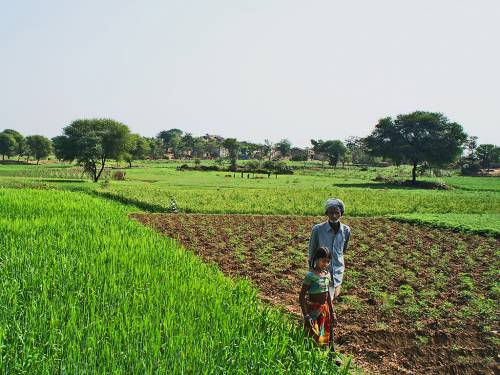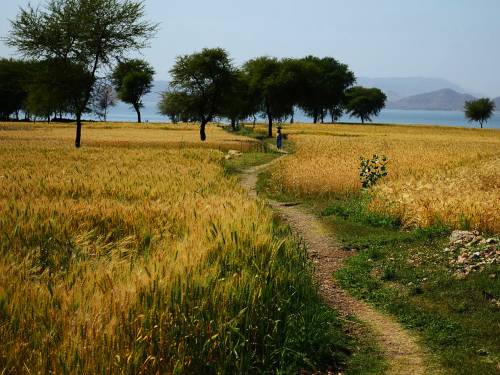Presbyterian Hunger Program provides critical funding
August 5, 2017
Rural farmers in India are celebrating the certification of Udaipur’s Gati village as Rajasthan’s first fully organic farming community. The designation will allow Gati to market its crops and products internationally. Nearly 300 farm families are covered by the designation as they seek to market crops such as wheat and corn.
For several decades, the Presbyterian Hunger Program (PHP) has been supporting local communities around the world that are trying to move away from corporately controlled seeds and return to a traditional seed model of saving and sharing.
“India is one country where our partners are working to promote traditional seeds over genetically engineered seeds,” said Valery Nodem, PHP’s international associate for hunger concerns. “We’ve been supporting groups that are trying to revive and retrieve traditional seeds because they believe the seeds are good for health, the soil and can produce a better yield if they are conserved and selected the right way.”
Since 1995, suicide has affected more than 300,000 Indian farmers, according to government census records, because of the stress and cost of farming.
“Farmers were told to buy corporate-produced seeds because they were told the seeds would be better,” Nodem said. “Farmers bought them not realizing they would have to buy more pesticides. One pesticide led to another and as a result, a lot of farmers got trapped in a cycle of debt and couldn’t dig out.”
PHP provided Udaipur’s Big Medicine Charitable Trust (BMCT) and its fiscal sponsor partner, Jagran Jan Vikas Samiti, with a grant for 2016, which collectively certified more than 150 farming households as organic in the Gati village community and established Rajasthan’s first women-farmer-run production company and heritage seed saving center.

A field in Udaipur’s Gati Village, which has become Rajasthan’s first fully organic farming community. (Photo courtesy of Big Medicine Charitable Trust)
“Many individual Rajasthani farmers have been certified as organic through various pricey third-party certifications. Some are subsidized by organizations who buy all of their produce to serve the high-end organic market,” said W. David Kubiak, development director for Big Medicine Charitable Trust. “Individual certification, however, is extremely problematic here when neighbors’ fields and waterways are drenched with herbicides and pesticides. Gati’s collective certification model ensures the reality of an ‘organic’ crop as well as inspiring stronger village solidarity and cooperative community bonds.”
Kubiak says the certification news offers hope to hundreds of other villages that have been hiding the fact that their crops are uncontaminated because they were ashamed they could not afford the widely advertised “modern chemical methods.” He adds that the certification also offers vindication to farmers who rejected agro-chemical inputs from the start. Kubiak and others believe it’s too soon to determine what the certification news will mean for the people.
“This will depend on subsequent marketing and crop diversification efforts to deliver the 10 to 15 percent price premiums on crop sales the villagers now expect,” he said. “Currently, the local media coverage of the certification is a source of village pride, but they are still waiting to see how it will change their lives. Monsoon flooding wiped out half of their harvests last year, so this is not simply a profit concern, but a matter of survival.”
“For Rajasthan, this is a big and timely milestone, because the state government has recently issued unfunded mandates to 11 of its 33 districts to create organic blocks (rural subdivisions) as soon as possible,” Kubiak said. “Since no programmatic guidance has been issued, local officials are at a loss on how to implement these directives, but the Gati model now offers them a clear, inexpensive and successful map. We and Jagran Jan are now working to compile a report on the project to dispatch to these designated districts to inspire and guide their own efforts in the months and years ahead. With luck, PHP will not only have helped catalyze an organic renaissance in one village, but across an entire state.”
Nodem added that farmers “are able to go back to growing food that respects the environment, the earth and is better for people. Having crop production certified is a very good example, and we will share this with other groups we are working with and tell them it is possible to go back to the traditional ways of growing food. That’s how the world was able to feed itself for over 2,000 years.”
Rick Jones, Mission Communications Strategist, Presbyterian Mission Agency
Today’s Focus: Presbyterian Hunger Program
Let us join in prayer for:
PC(USA) Agencies’ Staff
Rhonda Kruse, PMA
Rebecca Kueber, PMA
Let us pray:
Loving God, we pray for people who feel hopeless in a world that can be traumatic and overwhelming. We pray they will receive hope from your constant presence and promise. In Christ’s name. Amen.
Daily Readings
Morning Psalms 122; 149
First Reading 2 Samuel 5:22-6:11
Second Reading Acts 17:16-34
Gospel Reading Mark 8:1-10
Evening Psalms 100; 63
